
RESEARCH

4/15/2024
Vanderbilt Kennedy Center (TN IDDRC, UCEDD, LEND) Researchers Awarded $2.48M in Special Education Training Grants
Two Vanderbilt Kennedy Center (TN IDDRC, UCEDD, LEND) researchers have received two training grants totaling $2.48 million in funding from the Office of Special Education Programs at the U.S. Department of Education. The new grants address the need to train culturally conscientious special education teachers of students with high intensity needs. One of the grants will support training for teachers of students with limited or no functional speech. The other grant will support training for teachers of students with visual impairments. Both grants seek to recruit candidates from historically underrepresented groups or with a unique interest in supporting students from culturally and linguistic diverse backgrounds.

3/25/2024
IDDRC Research Brief: Providing Support for Families Affected by Rare Genetic Diseases
The RFK IDDRC unveils its groundbreaking "Operation IDD Gene Team" program developed by Dr. Steven Walkley. This multidisciplinary initiative supports families affected by rare genetic diseases causing intellectual & developmental disability (IDD).Operation IDD Gene Team brings together families, physicians, and scientists to foster understanding and empowerment. Through collaborative meetings, families share their experiences, physicians discuss clinical implications, and scientists provide insights into gene biology. Published in the Journal of Neurodevelopmental Disorders, this innovative program offers hope and guidance to families while advancing research into rare genetic diseases.

3/21/2024
Vanderbilt Kennedy Center (TN IDDRC, UCEDD, LEND) Researcher and Health Equity Champion Arie Nettles Retires
Vanderbilt Kennedy Center (TN IDDRC, UCEDD, LEND) researcher and longtime health equity champion Arie Nettles has retired from Monroe Carell Jr. Children's Hospital at Vanderbilt. As a psychologist and professor of Clinical Pediatrics at Monroe Carell Jr. Children's Hospital at Vanderbilt, her entire career has been spent ensuring the well-being of pediatric and adolescent patients with intellectual and developmental disabilities, autism and cleft craniofacial disorders.

2/22/2024
Transforming the Landscape of Behavioral Health Access for Geographically Dispersed and Military-Connected Children and Families across the Midwest
Accessing and navigating services for children with developmental, emotional, or behavioral health (D/E/B) concerns has greater complexity for military families, geographically-dispersed families, and families who are highly mobile or lack providers near their homes. University of Minnesota's Masonic Institute for the Developing Brain (MIDB) has received $3.5 million to lower these barriers as a partner in the Department of Defense Child Collaboration Study "A Research Collaboratory to Explore Best Practices for Expanding Access to Care Through Expansion and Support of Telehealth Care for Children and Families with Behavioral Health Needs."
2/1/2024
Medical and Dental Curricula on IDD: Training Inclusive Providers
A Study on How Medical and Dental Schools Teach Students about IDD
Past research has shown that many medical and dental students do not learn about IDD in school. The WITH Foundation, AUCD, and UC-LEND, led by Dr. Kashia Rosenau, collaborated to learn more about how medical and dental schools are teaching students about intellectual and developmental disabilities (IDD). The study found that most of the schools had self-advocates to help them teach their medical and dental students about caring for patients with IDD. The study also found that medical and dental students want to learn more about caring for their patients with disabilities. Overall, the study highlights the importance of teaching medical and dental students about caring for patients with IDD and including more self-advocates in this training.
9/21/2023
Peer Support and Research Engagement for Transition Age Young Adults with IDD Resources
Informed by community members, including young people with intellectual and developmental disabilities (IDD), the REACH Lab and Institute on Disabilities at Temple University developed free and easy-to-access resources about how peer support can help with successful transition and research.

9/21/2023
Prevalence: Extending ICI's Research
For years, researchers at the MN UCEDD have estimated autism prevalence among Minnesota school children. Now the researchers are also estimating the prevalence of cerebral palsy, spina bifida, and muscular dystrophy.
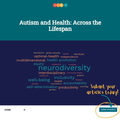
8/24/2023
Publishing Opportunity with AIR-P Cureus Channel
The AIR-P would like to share the Autism and Health: Across the Lifespan channel, where our authors can publish articles without cost and at a faster rate than is typically available through the traditional scholarly publication process.
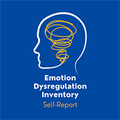
8/16/2023
Research Opportunity-University of Pittsburgh
The REAACT Program, is currently recruiting for our new EDI-Self-Report (EDI-SR) study. The purpose of this new research study is to create a questionnaire known as the EDI-Self-Report (EDI-SR). This project is funded by the Eunice Shriver National Institute of Child Health & Human Development (NICHD). The EDI-SR was designed in partnership with autistic individuals to measure emotional experiences in autistic teens and adults and teens and adults with other intellectual and developmental disabilities (IDD).
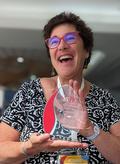
8/11/2023
Oregon Health & Science University UCEDD co-Director Receives Honor
Dr. Melanie Fried-Oken was named a fellow of the International Society for Augmentative and Alternative Communication (ISAAC) at their biennial conference this July 2023 in Cancun, Mexico. For the past 45 years, she has been developing and evaluating tools, strategies, technologies and intervention protocols with adults, children and their families who experience complex communication needs.

7/20/2023
"Let's Try a Different Way"
Agnes Cole is a recent MN LEND graduate who works at a service provider, runs her own non-profit organization, and who spent much of her fellowship working on a longitudinal study that tracks the living arrangements of people with intellectual and developmental disabilities who receive services.
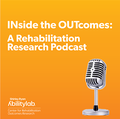
7/19/2023
New Podcast from the Center for Rehabilitation Outcomes Research at Shirley Ryan AbilityLab
The Center for Rehabilitation Outcomes Research at Shirley Ryan AbilityLab launched INside the OUTcomes: A Rehabilitation Research Podcast in March. Episodes feature research on employment and people with disabilities, home and community-based services and research highlights from the Center. Listen on Spotify or Apple Podcasts.
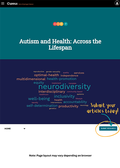
5/25/2023
AIR-P Launches New Academic Channel in Cureus
The Autism and Health: Across the Lifespan Channel (Autism and Health Channel) was founded in 2023 to promote research to increase the life expectancy and quality of life of autistic individuals. With broad support from national collaborative research entities, the goal of this academic channel is to serve as a forum to disseminate scientific articles which contribute to the evidence base of health promotion for autistic individuals and their families across the lifespan.
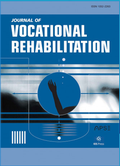
5/25/2023
Perspectives on the Implementation of Pre-ETS Services: Identification of barriers and facilitators to early career planning for youth with disabilities
There are differences between and within states in the delivery of Pre-Employment Transition Services (Pre-ETS) for students with significant disabilities early in their career planning process. This complicates the delivery of services for these youth with disabilities (YWD) and leaves gaps in communication between families, educators, and vocational rehabilitation (VR) counselors.
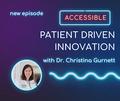
5/18/2023
Patient Driven Innovation with Dr. Christina Gurnett, Neurologist and Director of Washington University IDD Research Center
Dr. Christina Gurnett who is the co-director of The Intellectual and Developmental Disabilities Research Center at Washington University speaks to The Accessible Podcast about her community-based approach to cutting edge scientific research which puts individuals and families at the center.